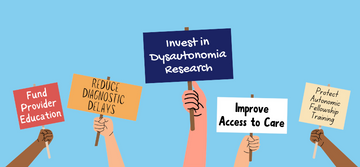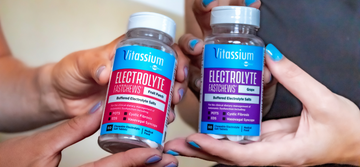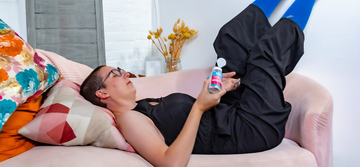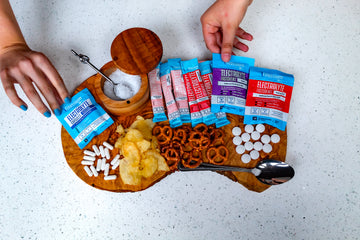
Raising awareness for dysautonomia and other chronic conditions is a cause close to our hearts at Vitassium.
Dysautonomia patients and allies, dressed in turquoise, recently converged on Capitol Hill in Washington, DC, for Dysautonomia Advocacy Day, hosted by Dysautonomia International. Among them was Vitassium Marketing Director, Joseph Havey, and Vitassium Brand and Customer Service Manager, Stacey Greenberg, both of whom have family members with dysautonomia.
“Almost every member of our team has a connection to the chronic illness community, so this is more than just a job for us – it's personal too. For Vitassium, giving back means more than just making great products. It’s also important that we show up for the community and advocate for broader changes,” Joseph said.

The group met with members of Congress to raise awareness about dysautonomia, improve provider education, reduce diagnostic delays, improve access to healthcare and treatments, and attract more researchers into the field.
Their asks included:
- Support $10 million to develop a provider education program on POTS and other forms of dysautonomia in Fiscal Year 2025 (FY25). Patients currently face an average diagnostic delay of five years and see an average of seven doctors before receiving a POTS diagnosis.
- Protect autonomic fellowship training and research at the National Institutes of Health (NIH).
- Support establishment of an infection-associated chronic illness office or center within the NIH. Certain types of dysautonomia often occur after an infection. Researchers estimate the number of POTS patients in the U.S. has doubled since the start of the COVID-19 pandemic.
Advocates, including the Vitassium team, are anxiously awaiting the results of their efforts.
With the dysautonomia community growing because of the pandemic, it’s more difficult than ever to get a timely diagnosis and access an autonomic specialist. Currently, there are only 56 board-certified autonomic disorders specialists in the U.S. Half of POTS patients travel over 100 miles for care, which isn’t affordable for many families. Improving provider education is vital to increasing quality of life for people with POTS and other types of dysautonomia.
“If these patients get help faster, they are less likely to get to a point where they are bed-bound,” Stacey said. “The longer they go without improving, the harder it is to recover.”
Joseph, Stacey, and other members of the Vitassium team are familiar with the struggles the estimated 40 million Americans with dysautonomia face. Although we have a small team, many of us either have a type of dysautonomia ourselves or love someone who does. That’s why we’ve been a proud partner of Dysautonomia International for seven years and donated over $100,000 to fund research and advocacy since our founding.
“There’s still a massive amount we don’t know about these conditions, and just because Long COVID has moved out of the headlines doesn’t mean we — or policymakers — should take our eye off the ball,” Joseph said. “The patient population hasn’t gone away. We still need education. We still need to fund research. Just because something is hard to understand and there are few answers doesn’t mean we should reduce our focus — if anything it’s a reason to invest more in looking for answers.”
To get involved, donate to Dysautonomia International or join their mailing list to be notified when virtual advocacy day is taking place later this year. For more ways you can support the dysautonomia community, check out our Instagram post.






